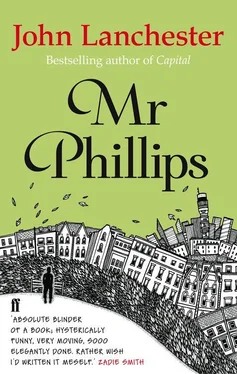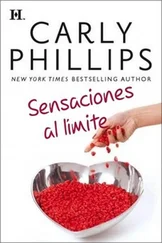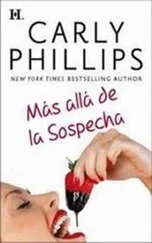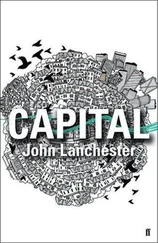None the less, he doesn’t see it that way. Not being here is in itself nothing to fear. The moment of transition, though — the moment of breaking through the veil of being-here and going through to notness, which presumably involves a terrible rending moment in which you realize what is happening, have full consciousness of what you are going through — now that seems to be worth fearing. If he could have a written guarantee from the responsible parties that death would be something he wouldn’t notice — here one moment, gone the next, with no lived transition — he would feel perfectly sanguine, even gung-ho, about the whole business. But the thought that you would be aware of what was going on as you died implied that somewhere in his future was a moment of the purest terror, terror at 200 proof, so that you could have a small taste of the fear every time you let your mind touch on the subject, even for a second or two.
Today, lying here on the floor of the bank, must be the closest Mr Phillips had been to death for many years — perhaps the closest since his friend Tony Wilson, who moved to Dorset to run a minicab company and whom he hadn’t seen for fifteen years, had crashed their car on the way back from a wedding in Suffolk. Tony was drunk — not paralytic, but tipsy. He had taken a corner too fast, skidded, and gone into a ditch about ten feet from a concrete drainage pipe. If they had hit the pipe they would have been dead.
‘You’re very lucky young men,’ the policemen had told them.
‘If we’d been that lucky what were we doing in the fucking ditch in the first place?’ Tony said. He knew that he was going to lose his licence anyway.
Mrs Phillips, who had been at home because she was eight and a half months pregnant with Martin and couldn’t face the round-trip drive to East Anglia, had forbidden her husband from ever travelling in a car driven by Tony again. That was a quarter of a century ago. Since then the nearest Mr Phillips has come to death is through the usual risks to do with strokes and heart attacks and haemorrhages, the things which can jump up and whack you, take you at any moment, as well as the longer-term, more stealthy killers, the ones that creep up on you from behind and kidnap you into the treeless country of terminal illness — the cancers, the degenerative diseases. In that sense he has lived with the same proximity to death as any other sedentary man in his fifties with a white collar job, the kind of intimacy you could have with an acquaintance who might drop in at any moment but who you would probably at the same time have no reason to expect on this particular day, or on any other day for a little while yet.
This raises the question of how likely death is, on any particular day. It came up one morning a few months ago, when they were all sitting around before the monthly progress meeting of the Accounts Department.
‘Hang on a minute,’ said Abbot, the youngest of them. ‘The odds against winning the Lottery are fourteen million to one, right?’
‘The odds against winning the jackpot,’ said Monroe in his Aberdonian voice. ‘Six divided by forty nine times five divided by forty eight times four divided by forty seven times three divided by forty six times two divided by forty five times one divided by forty four, which is 0.00000007151 or one in 13,983,816, usually referred to as one in fourteen million. So if the prize is greater than fourteen million quid it becomes a rational bet as supposed to just a stupidity tax.’
‘Assuming all the money goes to only one winner, which you can’t assume,’ said somebody else.
‘Fourteen million to one that you’ll get all six numbers right,’ said Monroe. ‘There is however another risk here which affects the likelihood of winning. Does anybody want to tell me what it is?’
Mr Phillips, who knew the answer because he had heard Monroe on the subject before, kept silent so as not to spoil his fun.
‘No takers. All right. The additional factor that needs to be taken into consideration is the chance of being dead by the time the Lottery results arrive — since, obviously, the chance of dying in any given week is much, much higher than that of winning the Lottery.’
There was a pause, the sound of six accountants sizing up a mathematical problem in their heads.
‘What’s the death rate? How many people die every week?’ said Austen.
‘According to the relevant Government agencies,’ said Monroe, ‘the population of England at the time of the last estimate was 49,300,000. The previous year, deaths totalled 526,650. The death rate per week was therefore 10,128, rounded up to the nearest cadaver. Using these data we find that for an Englishman the chance of dying in any given week is therefore 0.0002054, or one in 4880.’
‘So your chance of winning the Lottery’, said Abbot at his calculator, ‘is, er, 2873 times worse than your chance of being dead by the time of the National Lottery draw.’
‘But we’re assuming you buy the ticket at the start of the week,’ Monroe went on. ‘In other words, if you buy your ticket at the start of the week and hold it until the draw, your chance of being dead by the time of the result is much better than your chance of winning. But most people don’t buy the ticket on Sunday, they buy it in the middle of the week before the draw, and so their odds are better. If you buy your ticket at four o’clock on Friday afternoon your chance of not being dead before the result must be significantly improved.’
They were already doing the sums.
‘Assuming the deaths are spread evenly over the calendar —’
— which Mr Phillips didn’t feel you could assume. Surely more people died in winter and at weekends, of drinking and fighting and the stress of being cooped up with their families and so on? But he didn’t say anything –
‘That means that the chance of dying, for a random member of the population, is 0.0107 per year, or 0.0000293 per day, or 0.00000122 per hour, or 0.0000000203 per minute. In other words each of us has a 1 in 49,200,000 chance of dying in any given minute. So in order for the probability of winning the jackpot to be greater than the chance of being dead by the time of the draw one would have to bet no earlier than’, Monroe tapped some figures into his Psion Organiser, ‘three and a half minutes before the draw.’
‘Christ,’ said someone.
‘But that’s averaging the risk out,’ Monroe continued. ‘Obviously a nineteen-year-old girl who doesn’t drink, doesn’t smoke, has no familial history of anything and whose great-grandmother is still alive at the age of 102 is more likely not to be dead than a sixty-year-old chain-smoking alcoholic with a Private Pilot’s licence. We’d need to get hold of some proper actuarial tables,’ he concluded, giving the word ‘proper’ a discreet but very Scottish emphasis. At that point Mr Mill the useless departmental head came into the room, the conversation petered out and the meeting began instead.
Monroe, however, did not forget. About two weeks later a notice appeared on the board in the company canteen saying ATTENTION LOTTERY GAMBLERS, and below giving a breakdown, along the lines discussed, of the averaged-out risk of being dead compared to the chance of winning the Lottery. The table gave a time after which the chances of winning the Lottery were better than those of being dead by the end of the week.
AGE HOW LATE TO LEAVE IT Under 16 1 hour 10 minutes 16–24 1 hour 8 minutes 5–34 51 minutes 35–44 28 minutes 45–54 11 minutes 55–64 4 minutes 65–74 1 minute 75 and over 24 seconds
It had lingered in the mind. Mr Phillips wonders what his relative chances of being dead before this week’s Lottery draw are at this precise moment. In all probability they have never been better. Or worse, depending on your point of view. It would only take a single convulsive motion of one robber’s finger. The feeling was the same as the one you sometimes have driving, when it occurs to you that all it would take is a strong twitch on the steering wheel and your car will go across the line into oncoming traffic, or over the kerb into a wall, or through a hedge or a ditch or a shop window, any of those things which people in film accidents do to comic or exciting effect but which in real life involve death. This is like that feeling only more so. All that would have to happen is for one of the bank robbers to conceive a dislike of Mr Phillips as he lies spreadeagled and puffing on the floor, inhaling minute particles of dog shit.
Читать дальше




![Unknown - [Carly Phillips] The Bachelor (The Chandler Brothe(Bookos.org) (1)](/books/174132/unknown-carly-phillips-the-bachelor-the-chandle-thumb.webp)







